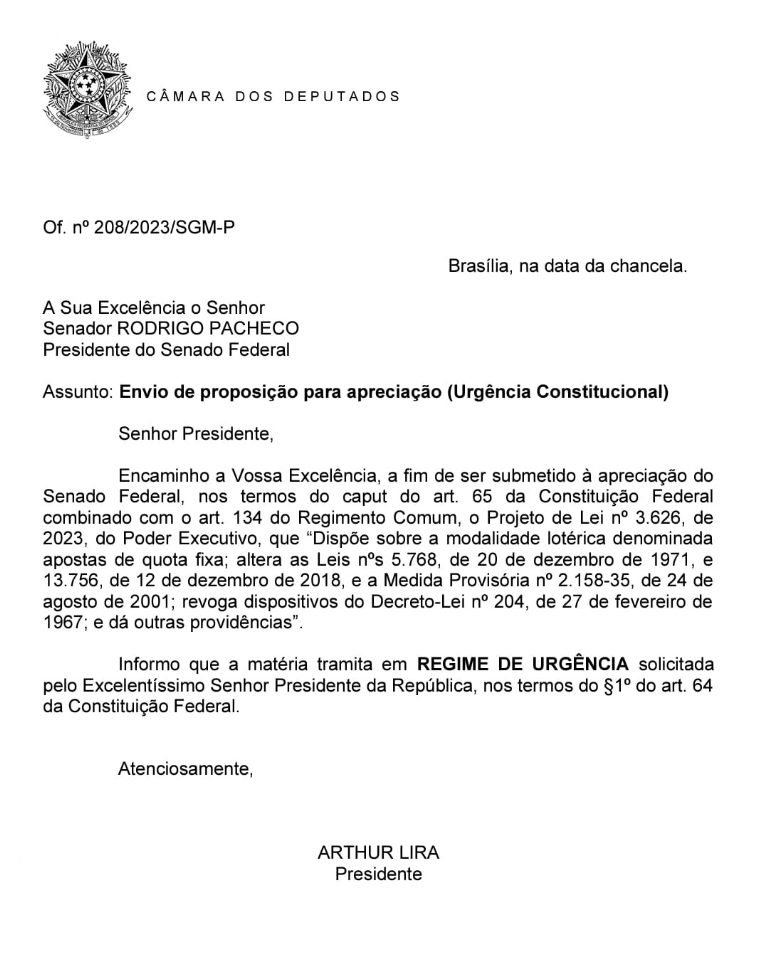

Bill 3626/23, from the Executive Branch, was approved by the Chamber last week. The project is considered part of a schedule of initiatives to reinforce government revenue and combat public deficit.
"Once it reaches the Federal Senate, the project will be sent to the appropriate committees. We know the importance of having structuring projects for the collection and support of the tax regime," stated the president of the Senate, Rodrigo Pacheco, last Thursday (14), after a meeting of leaders.
The project was presented in July, together with Provisional Measure (PM) 1,182/2023. The first dealt with the structure and administrative processes for monitoring this sports betting market and the provisional measure was focused on regulating the betting market. As the commission to analyze the measure has not yet been installed, its content ended up being incorporated into that of the project approved by the Chamber, in the form of a substitute for the rapporteur, deputy Adolfo Viana (PSDB-BA).
According to the government, the proposals aim to establish clear rules for the fixed-odd betting market, created by Law No. 13,756/2018, filling a regulatory gap observed since its creation. The Ministries of Finance and Sports are co-authors of the proposed texts of the PM and the project.
"This is a project that was first oriented to legalize and regularize an economic activity that is growing in Brazil and around the world. It is important to regularize it on paper. It is also necessary to organize this economic activity and take advantage of part of these resources to invest in sport, tourism, and social security," said the chief minister of the Institutional Relations Secretariat, Alexandre Padilha, who considered the approval a victory for the government.
Rules
The current law on this type of lottery provides that companies keep 95% of gross revenue (after prizes and income tax), while the project leaves them with 82%. The remaining 18% will be divided between education (1.82%), sport (6.63%), tourism (5%), social security (which according to the text of the PM would have 10%, but in the approved project it was 2%) and National Public Security Fund (2.55%, currently provided for by law).

The grant for the sector will be onerous, with a maximum payment of R$30 million (US$ 6.15m) for the authorization, to be granted to those who meet the requirements. The amount allows the use of an electronic channel (a betting app) per act of authorization and must be paid within 30 days from the authorizing act. This authorization may, at the discretion of the Ministry of Finance, be for up to three years and will be highly personal, non-negotiable and non-transferable.
Contrary to what the government proposed in PM 1182/23, only companies incorporated under Brazilian legislation, with headquarters and administration in the national territory, will be able to request authorization, leaving foreign companies out.
Advertising
One of the biggest points of concern for critics of the regulation is the advertising of this type of company. In the first days of the PM's processing, several parliamentarians presented amendments to restrict betting advertising or even ban it. This is the case of senator Eduardo Girão.
In the PM, the senator had already presented amendments to prohibit advertising by these companies in all mass media, such as newspapers, television, radio and social media. The senator also wanted to prohibit bets from sponsoring teams, individual athletes and championships, a practice that has become increasingly common. He also proposed an amendment to prohibit companies from providing discounts, credits or any type of bonus to encourage the first bet.
"There is a very powerful lobby behind it that is addicting young people to the elderly. People who have never put a drop of alcohol in their mouth, because it is a national passion that is football, are falling for these bets because nowadays it is very difficult you watch a football match. It's all the time “bet, bet, bet, bet”. Take the player who is the idol and have him advertise all the time," said the senator in an interview with Agência Senado.
The approved text prohibits commercial advertising by companies without authorization to operate the lottery; that conveys unfounded claims about the chances of winning or about possible gains that bettors can expect; or that presents the bet as socially attractive or contains statements from well-known personalities and celebrities that suggest that gaming contributes to personal or social success.
These advertising pieces also cannot suggest or give rise to the understanding that betting can be an alternative to employment, a solution to financial problems, a source of additional income or a form of financial investment. Even so, Girão said he considered the text pernicious and promised to work to reject the project.
"We are going to fight here in the Senate so that the project passes through several committees and so that all our fellow senators can understand how pernicious this sports betting project is. The text is coming from the Chamber in a very bad way. We will need to have a lot of serenity and responsibility with Brazil and with Brazilians to reject," said the senator.
Source: GMB / Agência Senado